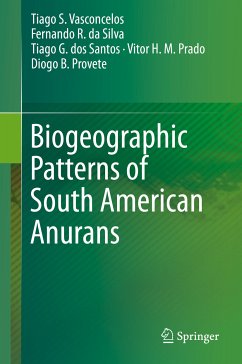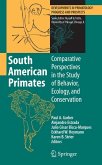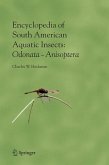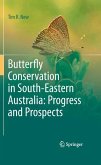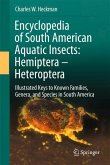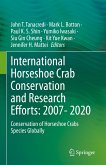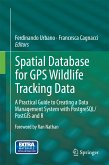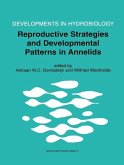Biogeographic Patterns of South American Anurans (eBook, PDF)


Alle Infos zum eBook verschenken

Biogeographic Patterns of South American Anurans (eBook, PDF)
- Format: PDF
- Merkliste
- Auf die Merkliste
- Bewerten Bewerten
- Teilen
- Produkt teilen
- Produkterinnerung
- Produkterinnerung

Hier können Sie sich einloggen

Bitte loggen Sie sich zunächst in Ihr Kundenkonto ein oder registrieren Sie sich bei bücher.de, um das eBook-Abo tolino select nutzen zu können.
This book analyzes different facets of anuran amphibian distribution in South America. We integrate alternative biological metrics employing cutting-edge methods to understand the dynamic processes underlying species distribution patterns. By using the modern biogeographic toolbox, we explore how richness gradients, phylogenetic diversity, functional diversity, and range size/endemism distribution of amphibians vary along the continent. Moreover, we present a robust proposal for priority areas for conservation of anurans in South America that maximizes representativeness of distinct biodiversity facets. …mehr
- Geräte: PC
- ohne Kopierschutz
- eBook Hilfe
- Größe: 2.73MB
![South American Primates (eBook, PDF) South American Primates (eBook, PDF)]() South American Primates (eBook, PDF)193,95 €
South American Primates (eBook, PDF)193,95 €![Encyclopedia of South American Aquatic Insects: Odonata - Anisoptera (eBook, PDF) Encyclopedia of South American Aquatic Insects: Odonata - Anisoptera (eBook, PDF)]() Charles W. HeckmanEncyclopedia of South American Aquatic Insects: Odonata - Anisoptera (eBook, PDF)233,95 €
Charles W. HeckmanEncyclopedia of South American Aquatic Insects: Odonata - Anisoptera (eBook, PDF)233,95 €![Butterfly Conservation in South-Eastern Australia: Progress and Prospects (eBook, PDF) Butterfly Conservation in South-Eastern Australia: Progress and Prospects (eBook, PDF)]() Tim R. NewButterfly Conservation in South-Eastern Australia: Progress and Prospects (eBook, PDF)113,95 €
Tim R. NewButterfly Conservation in South-Eastern Australia: Progress and Prospects (eBook, PDF)113,95 €![Encyclopedia of South American Aquatic Insects: Hemiptera - Heteroptera (eBook, PDF) Encyclopedia of South American Aquatic Insects: Hemiptera - Heteroptera (eBook, PDF)]() Charles W. HeckmanEncyclopedia of South American Aquatic Insects: Hemiptera - Heteroptera (eBook, PDF)258,95 €
Charles W. HeckmanEncyclopedia of South American Aquatic Insects: Hemiptera - Heteroptera (eBook, PDF)258,95 €![International Horseshoe Crab Conservation and Research Efforts: 2007- 2020 (eBook, PDF) International Horseshoe Crab Conservation and Research Efforts: 2007- 2020 (eBook, PDF)]() International Horseshoe Crab Conservation and Research Efforts: 2007- 2020 (eBook, PDF)177,95 €
International Horseshoe Crab Conservation and Research Efforts: 2007- 2020 (eBook, PDF)177,95 €![Spatial Database for GPS Wildlife Tracking Data (eBook, PDF) Spatial Database for GPS Wildlife Tracking Data (eBook, PDF)]() Spatial Database for GPS Wildlife Tracking Data (eBook, PDF)113,95 €
Spatial Database for GPS Wildlife Tracking Data (eBook, PDF)113,95 €![Reproductive Strategies and Developmental Patterns in Annelids (eBook, PDF) Reproductive Strategies and Developmental Patterns in Annelids (eBook, PDF)]() Reproductive Strategies and Developmental Patterns in Annelids (eBook, PDF)113,95 €
Reproductive Strategies and Developmental Patterns in Annelids (eBook, PDF)113,95 €-
-
-
Dieser Download kann aus rechtlichen Gründen nur mit Rechnungsadresse in A, B, BG, CY, CZ, D, DK, EW, E, FIN, F, GR, HR, H, IRL, I, LT, L, LR, M, NL, PL, P, R, S, SLO, SK ausgeliefert werden.
- Produktdetails
- Verlag: Springer International Publishing
- Seitenzahl: 149
- Erscheinungstermin: 28. August 2019
- Englisch
- ISBN-13: 9783030262969
- Artikelnr.: 57596002
- Verlag: Springer International Publishing
- Seitenzahl: 149
- Erscheinungstermin: 28. August 2019
- Englisch
- ISBN-13: 9783030262969
- Artikelnr.: 57596002
- Herstellerkennzeichnung Die Herstellerinformationen sind derzeit nicht verfügbar.
TS Vasconcelos obtained his BS in Biological Sciences (2002) and MSc in Animal Biology (2005) both from the Sao Paulo State University (UNESP/Sao Jose do Rio Preto, SP, Brazil), and PhD in Biological Sciences-Zoology (2009) from the UNESP/Rio Claro (SP, Brazil). He was a post-doctoral fellow in the Department of Ecology and Evolutionary Biology at the University of California - Irvine (Prof. Dr. Bradford A. Hawkins' lab: 2010-2011). From 2012 to 2016 he was a Young Researcher fellow at the Department of Biological Sciences (UNESP/Bauru, SP, Brazil). Currently, he is a post-doctoral fellow in the Department of Biological Sciences (UNESP/Bauru, SP, Brazil). His research focus on understanding patterns of species distributions in the Neotropics.
FR da Silva obtained his BS in Biological Sciences (2004) from the Sao Paulo State University (UNESP/Assis, SP, Brazil) and both MSc (2007) and PhD (2011) in Animal Biology from UNESP/São José do Rio Preto (SP, Brazil). He holds aProfessor position at the Department of Environmental Sciences, Federal University of São Carlos (UFScar/Sorocaba, SP, Brazil) since 2011. His research tries to understand the processes and mechanisms underlying amphibian species distribution at different spatial scales, focusing mainly on anuran species of Atlantic Forest and Cerrado.
TG Santos obtained his BS in Biological Science (2003) from Federal University of Santa Maria (UFSM, RS, Brazil), and both MSc in Animal Biology (2005) and PhD in Biological Sciences-Zoology (2009) from the São Paulo State University (UNESP, SP, Brazil). He spent one year as post-doctoral fellow from the São Paulo State University (UNESP/Rio Claro, SP, Brazil). Since 2010, he holds a Professor position at the Federal University of Pampa (UNIPAMPA). Currently, he also contributes to the Pos-Graduate Program in Animal Biodiversity of the Federal University of Santa Maria (UFSM), having mentored students for the MSc and PhD degrees in researcheson diversity and natural history of herpetofauna (especially in the Brazilian subtropical ecosystems).
VHM Prado obtained his BS in Biological Sciences (2003), MSc (2006) and PhD (2009) in Animal Biology from the Sao Paulo State University (UNESP/Sao Jose do Rio Preto, SP, Brazil). He was a post-doctoral fellow in the São Paulo State University (UNESP/Rio Claro, SP, Brazil) (2010-2013) with a six-month period as visiting scholar (2011-2012) at the Pedro Peres-Neto's lab at the Université du Québec à Montréal (Canada). Currently, he is lecturer and researcher at the Goiás State University (UEG), Anápolis, GO, Brazil.
